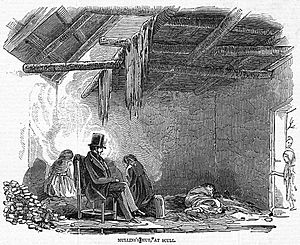Robert Traill (Irish clergyman) facts for kids
Quick facts for kids The Reverend Doctor Robert Traill |
|
|---|---|
| Rector of Schull | |

Mahony's sketch of Traill visiting a dying man's home in 1847
|
|
| Church | Church of Ireland |
| Diocese | Cork, Cloyne and Ross |
| In Office | 1832–1847 |
| Personal details | |
| Birth name | Robert Traill |
| Born | 1793 Lisburn, County Antrim |
| Died | 1847 (aged 53–54) Schull, County Cork |
Robert Traill (1793–1847) was a church leader in the Church of Ireland. He was the rector (a type of priest) for the town of Schull, County Cork, from 1832 until he passed away. He also owned part of a copper mine in that area. Robert Traill was known for his kindness during the terrible Great Famine in Ireland, which started in 1846. His efforts to help people were even shown in a newspaper called the Illustrated London News.
Early Life and Work
Robert Traill was born in Lisburn, County Antrim, on July 15, 1793. His father was Anthony Trail and his mother was Agnes Watts Gayer.
He earned a special university degree called a Doctor of Divinity. In 1832, he became the rector of Schull, County Cork. A rector is a priest who is in charge of a church and its area.
Traill was very passionate about his Christian beliefs. He also translated some old writings by Josephus, a Jewish historian from the first century, into English.
In 1840, he became a member of the Royal Society of Edinburgh. This shows he was likely in Edinburgh around that time.
Robert Traill is believed to have found copper at the Dhurode mine near Mizen Head. This mine was active between 1844 and 1846. He owned a large share of the mine, and one of its six mining shafts was named after him.
Traill was involved in the Tithe War. During this time, many Roman Catholics did not want to pay tithes. Tithes were payments to the Church of Ireland, which was the official church. Traill was sad that people were refusing to pay him these tithes.
Helping During the Great Famine
When the Great Famine began in 1845, Traill first thought that improving how potatoes were stored would save them. He worked on building air shafts for potato pits in October 1845.
However, he soon realized this would not be enough. By December, he tried to convince local landlords to let their tenants keep some grain. This would stop people from having to eat the potatoes they needed for planting.
Traill started a relief committee in his parish to help those in need. He wrote many letters asking people to donate money to it. The Illustrated London News showed a picture of him visiting a sick man and his family. The artist, James Mahony, said Traill's kindness "is beyond praise."
Traill set up a soup kitchen at his own home. He wrote that his house was "more like a beleaguered fortress." He meant that crowds of hungry people gathered there from early morning. He and his family worked tirelessly to feed everyone.
In February 1847, he showed Commander James Crawford Caffin of HMS Scourge how bad the famine was. Caffin wrote that he saw "wholesale misery" and "the dead or dying" in almost every house. Caffin's letter was printed in newspapers, which brought some help from the British Government to Schull.
However, the situation worsened. By March, Traill said the suffering was much worse than when Captain Caffin visited. Traill is said to have spent most of his own money helping the poor.
Death and Family
Robert Traill died on April 21, 1847, from "famine fever," which was typhus.
He was married to Anne Hayes. They had a large family. His grandsons included Johnny Traill, a famous polo player, and John Millington Synge, a well-known playwright. His great-great-great granddaughter, Daisy Goodwin, is a TV producer and writer. She even included Robert Traill in an episode of the TV show Victoria.
Images for kids
 | George Robert Carruthers |
 | Patricia Bath |
 | Jan Ernst Matzeliger |
 | Alexander Miles |


